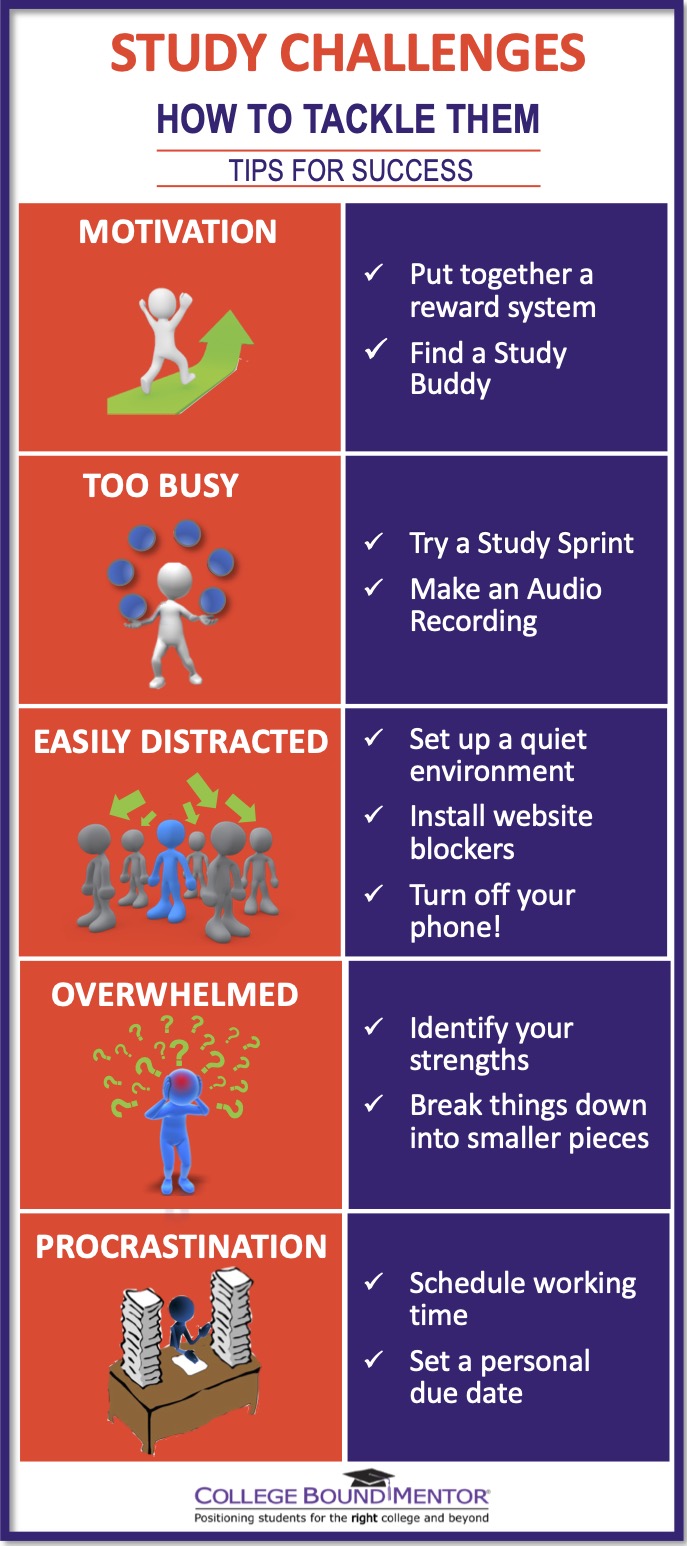Study Challenges and How to Tackle Them
By: Rebecca Bleich
If you just put in more work, you’d get better grades. If you just spent less time on Netflix or playing video games, think how much better you’d do in school! If you just studied how I showed you, think how much better you could do!
Do these phrases sound familiar? I often hear this lament from parents when they become frustrated by their child’s apparent poor study skills. But most kids have never learned how to study, and with AP exams and standardized testing fast approaching alongside all the stressors of junior and senior year, getting started can be overwhelming.
Here are some examples of students I’ve worked with and the common study challenges they’ve faced. I’ll provide some advice based on what worked for each of the different students.
Lack of Motivation
Matilda found it hard to drum up the motivation to study for her AP Biology exam. She was Zoomed out, and by the end of the day, the last thing she wanted to do was hole up in her bedroom and memorize diagrams and facts. She also really missed the environment of studying in person with her classmates. Here were some of the ideas we came up with to make her more motivated to study.
How to tackle it
Put together a rewards system.
This can be self-directed or with the help of your parents if they want to get onboard. Make sure the rewards are something you really want and wouldn’t get under normal circumstances. Matilda loved to buy toys for her dog, so after a successful week of studying, she would pick out a cute new dog toy.
Find a study buddy.
If you’re having trouble being motivated, find a friend to suffer through it with you. You don’t necessarily have to study together, but you can hold each other accountable to study during a designated time. Matilda used StudyStream to hold herself accountable. Seeing screens of others studying or even practicing an instrument made it feel more like they were all working in the same room together.
Too Busy
Blake was a rising senior who was constantly on the go. Between basketball practice, Science Olympiad, and Model UN, he almost never had a free moment to really buckle down and study for his AP exams. We also didn’t want him to get burnt out by adding too much extra work to his routine.
How to tackle it
Try a study sprint.
Block off a period of time every day for as long as you feel like you can spare. It can be as quick as twenty-five minutes. Set a study timer for those twenty-five minutes and put all your attention to studying one difficult topic.
Make an audio recording.
Record yourself reading off important notes or concepts you want to review. You can even use yourself as a study partner. The great thing about a recording is you can use it to study in the car, on the bus, or any time you’re in transit between activities. Blake would listen to his notes for AP Gov while traveling to and from basketball games.
You get distracted while studying
Angela went into studying with the best intentions, but she would somehow always find herself on TikTok or YouTube a few minutes into a study session. This made it hard for her to focus on practice sections for her SAT review. These were some ideas we came up with to eliminate her sources of distraction and dance videos.
How to tackle it
Set up your environment for success.
Find a quiet place to study without the distraction of other people or noises. If possible, try unplugging and studying with a book or notecards. While this may seem like a throwback, it will eliminate the easy access to the internet.
Install a website blocking extension.
Sometimes when you’re studying, it’s all too easy to end up on Instagram or YouTube without even knowing how you got there. Installing a website blocker extension can prohibit access to certain websites for a set amount of time. This will take away some of the temptation of internet browsing and make it easier to give your attention to studying.
Turn off your phone.
If your phone is off, you won’t see your notifications. It’s also much less tempting to check because then you’ll have to wait for your phone to completely restart, rather than just checking for updates.
The amount of material is overwhelming
Finishing up a busy junior year, Hao had both AP exams and the ACTs to study for. With four AP classes in his busy schedule, he didn’t know how to get started with studying, so he avoided it. We worked together on a plan to maximize his study time without making him overwhelmed.
How to tackle it
Figure out where you’re strong.
Make a list of all the concepts you need to know for an exam and put them into three categories:
- I know this well
- I need more practice
- I don’t know this at all.
After that, you can prioritize where to put your study efforts. Hao realized he was strong in French but needed more practice in physics, so he spent more energy studying physics.
2. Break things down.
If you’re studying for a big test, it may seem like you’ll never get through all the material you need to study. Instead of facing all the topics head on, try making a schedule for what you want to focus on each week. Google calendar is a great tool to help you plan it out. Every week can be a different topic. For example, if you pick a challenging grammar topic for one week, the next week can be a math topic where you need more practice.
Procrastination
Meher was the queen of procrastination. If something was due Monday, she’d be up all night Sunday trying to get it done. Meher would often forget about things until right before the due date, or she would put it off because she was confident she could get it done even if she waited until the last minute. Even though she was stressed out by her procrastination, it was a tough habit to break.
How to tackle it
Schedule working time.
Most of the time when students have an assignment, they only put the due date on the calendar. Try scheduling a day you want to get started as well as a day to have a first draft done. This will help break down the process to make the work more manageable. Watch this video on how to set reminders and tasks in Google Calendar
Make a personal due date.
For some students, it can be helpful to schedule a preliminary due date. This way, you can ‘procrastinate’ on that earlier date instead, but the stakes are much lower. If the official due date is on a Friday, try making your personal due date for the Thursday. Add the date to your calendar with a reminder of when it’s due.
Everyone has different study preferences and it’s a great idea to try out several different methods. However you decide to study, find a system that works for you.


